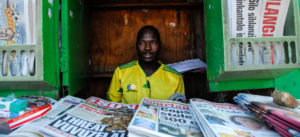397 Results
21 мост смотреть онлайн smotretonlaynfilmyiserialy.ru

July 2018, Volume 29, Issue 3
Explaining Eastern Europe: Orbán’s Laboratory of Illiberalism
Viktor Orbán’s Fidesz party has used its two-thirds majority in parliament to change the constitution, erase checks and balances, and make the electoral system even more majoritarian.

October 2018, Volume 29, Issue 4
Latin America’s Shifting Politics: Mexico’s Party System Under Stress
AMLO’s sweeping victory in Mexico’s 2018 elections could point to a long-term dealignment of the country’s party system, but it is more likely that a less radical process of partisan recomposition will take place.


July 2023, Volume 34, Issue 3
Why Russia’s Democracy Never Began
People obsess over where Russia’s democracy went wrong. The truth is it did not fail: Russia’s democratic transition never got off the starting blocks.

July 2018, Volume 29, Issue 3
Explaining Eastern Europe: Imitation and Its Discontents
For countries emerging from communism, the post-1989 imperative to “be like the West” has generated discontent and even a “return of the repressed,” as the region feels old nationalist stirrings and new demographic pressures.

July 2010, Volume 21, Issue 3
The Democratic Instinct in the 21st Century
Democratization is never easy, smooth, or linear, but as Indonesia’s experience in building a multiparty and multiethnic democracy shows, it can succeed even under difficult and initially unpromising conditions.
January 2017, Volume 28, Issue 1
The Three Regions of the Old Soviet Bloc
Today, there are three parts of the old Soviet bloc—one is democratic, another is wholly authoritarian, and a third “intermediate” group is caught between two worlds. This last should be the main focus of Western assistance.
October 2007, Volume 18, Issue 4
Nigeria’s Muddled Elections
The failure of the elections has been partly mitigated by the hope of judicial review of electoral malfeasance, the stabilizing ingenuity of ethno-regional power-sharing, and renewed national discussions of electoral reforms.
April 2007, Volume 18, Issue 2
Montenegro: A Miracle in the Balkans?
Tiny Montenegro gained its independence in a referendum in May 2006. What forces lay behind its completely peaceful break from its much larger neighbor, Serbia?
October 1997, Volume 8, Issue 4
Election Watch
Reports on elections in Albania, Bolivia, Congo-Brazzaville, Croatia, Liberia, Mali, Mexico.


July 2021, Volume 32, Issue 3
Latin America Erupts: Millennial Authoritarianism in El Salvador
Nayib Bukele has developed a blend of political tactics that combines populist appeals and classic autocratic behavior with a polished social-media brand. It poses a dire threat to the country’s democratic institutions.
April 2013, Volume 24, Issue 2
Election Watch
Reports on elections in Armenia, Barbados, Czech Republic, Djibouti, Ecuador, Ghana, Jordan, Kenya, and South Korea.
The Road to Digital Unfreedom
Since the internet’s arrival in the People’s Republic of China (PRC) in 1994, digital technologies have provided a critical channel of communication for Chinese citizens. In an environment where speech and access to information are heavily restricted, the internet has enabled citizens to get uncensored news, speak their minds, and even organize protests. Over the…


April 2020, Volume 31, Issue 2
The Squeeze on African Media Freedom
Sub-Saharan African governments are clamping down on media freedom. More surprising is how many of their citizens appear to support this attack on the press.
October 2002, Volume 13, Issue 4
Election Watch
Reports on elections in Bolivia, Cameroon, Congo-Brazzaville, the Czech Republic, Guinea, Papua New Guinea.
April 2013, Volume 24, Issue 2
Lessons from Latin America: The Rise of Rentier Populism
Latin America’s much-discussed political “left turn” has taken two very different forms. Why has the region’s commodities boom led some left-turn states to move toward “plebiscitarian superpresidentialism,” while others have resisted this temptation?
July 2010, Volume 21, Issue 3
Afghanistan & Iraq: Iraq—A Vote Against Sectarianism
Although many Iraqi parties continue to be organized along religious or ethnic lines, both the tone and the results of the 2010 parliamentary election campaign show that most Iraqi voters prefer a broader national agenda over narrow sectarian appeals.
Winter 1990, Volume 1, Issue 1
Election Watch
Reports on elections in Belize, Botswana, Brazil, Chile, Honduras, Hungary, India, Jordan, Namibia, South Africa, Taiwan, and Uruguay.
October 2015, Volume 26, Issue 4
Election Watch
Reports on elections in Burundi, Ethiopia, Guatemala, Haiti, Mexico, Singapore, Sri Lanka, and Trinidad and Tobago.
